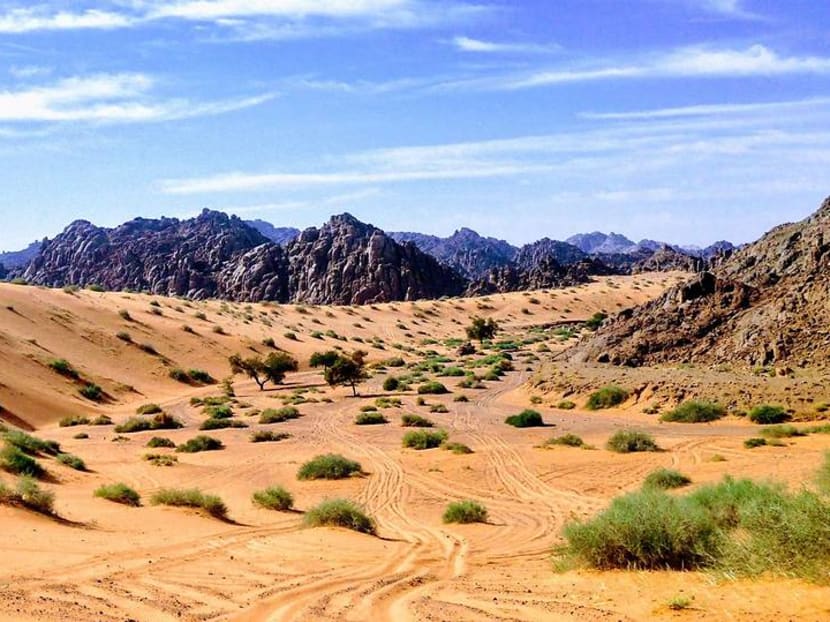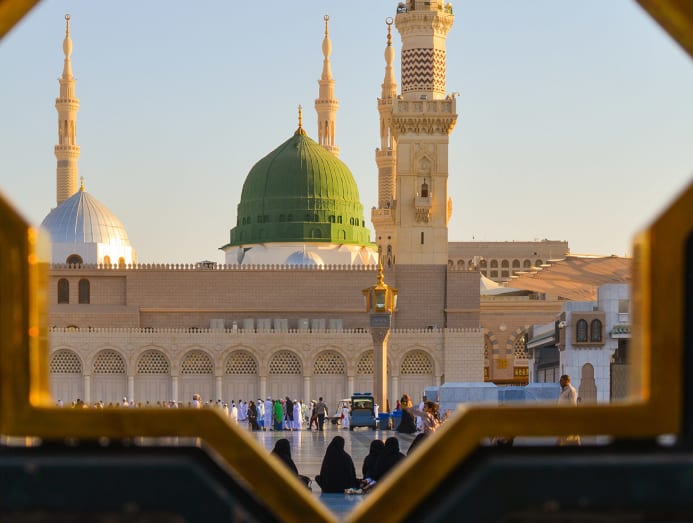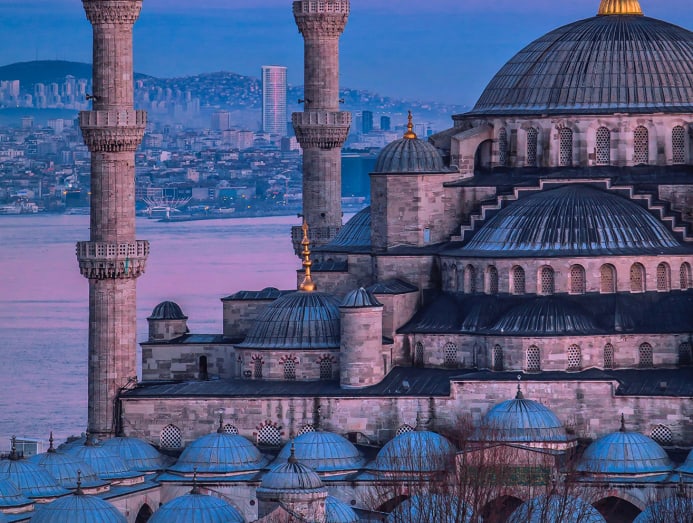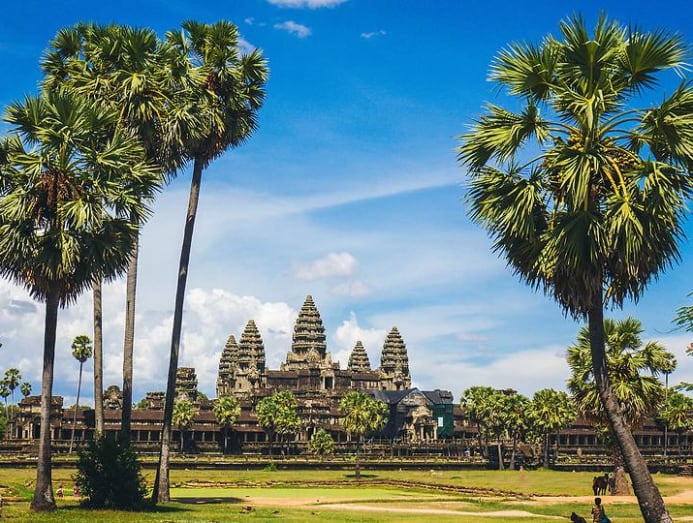Sun, sea and Saudi: How countries around the world are courting Muslim tourists
Advert
Experiences
Sun, sea and Saudi: How countries effectually the earth are courting Muslim tourists
As Muslims are expected to spend an estimated S$244 billion on travel this twelvemonth – a figure ready to increment to S$380 billion by 2023 – countries around the world are ramping up efforts to cater to the needs of halal tourists.

Saudi Arabia'south Al-Nefud desert. (Photo: Unsplash/Abah al Shammary)
29 May 2022 06:30AM (Updated: 04 Jul 2022 05:22PM)
Imagine a pristine, sun-kissed coastline stretching for more than than a chiliad miles. Think of white sands locked between wild, rocky cerise mountains and warm crystal waters, and hardly a soul to exist seen. Information technology all sounds idyllic.
But so consider this is Saudi Arabia, a country with plans to attract 30 1000000 international leisure visitors a year by 2030. This represents a substantial increment over the eighteen million who currently travel there mainly for business or to observe Muslim religious obligations.

Saudi is non alone, though it is most definitely starting out from a lower rung than most other countries, given the traditionally airtight nature of its lodge and its emphasis on religious tourism. But the tremendous sums of coin spent past Muslims on travel each yr is tantalising for a nation that is drastic to wean its economy off oil revenues by opening up new segments similar travel.
Halal tourism is a catch-all term for Muslim leisure travellers who want the convenience to observe their religion while on vacation. There is no fix definition, all the same. Some operators might offer niggling more than than an alcohol-free restaurant serving halal food. Others will go as far as banning any alcohol from their premises and offering segregated beaches and pools and so women and young children can sunbathe in complete privacy.
READ> Modest luxury: Seven of the best halal hotels for a post-Ramadan holiday
Facilities like prayer rooms, the qibla, or arrow to bespeak the direction of Mecca, in bedrooms are also available at all Muslim-friendly hotels, as are copies of the Quran.
According to the latest State of the Global Islamic Economy report by Thomson Reuters, Muslims will spend an estimated Us$177 billion (South$244 billion) on travel around the world this year. Though this figure is currently proportionate to overall travel spending, it is ascent. The same study predicts Muslims will be spending an additional US$100 billion on their travels in four years' time.
READ> Iftar in Malaysia: The best Ramadan buffets in sumptuous Kuala Lumpur
Fazal Bahardeen, founder of Singapore-based Crescentrating, which assesses travel and tourism services for their Muslim friendliness, believes the Islamic tourism market is "evolving".
"The market for Muslim travellers is seeing growth, which is leading to more facilities and services emerging for them," Bahardeen said. "Hotels in particular are really starting to see the potential of the Muslim traveller and we are witnessing more than and more than getting into halal tourism."

Turkey is arguably the leader in the more bourgeois form of halal tourism. Afterward Malaysia, Indonesia and the UAE, it is the 4th most popular destination for tourists seeking Islamic comforts.
Its government has added halal tourism to the priorities for its current economic plan and is providing incentives to convert conventional hotels into ones that are halal-friendly. This yr, Crescentrating named Turkey the world's third-best halal tourist destination, after Indonesia and Malaysia.
"When it comes to beach resorts, Turkey has a lot of these and they're very well established. They are beginning to empathise the potential of halal tourism and accept carved out this niche marketplace that you don't find anywhere else," said Bahardeen.
Turkey is an established tourist destination, nonetheless, whereas Saudi is starting pretty much from scratch. Merely it attempting to make its offer attractive to newcomers and visitors who might previously but have visited for umrah or hajj.
Getting a visa for Saudi has long been considered a thankless task, fifty-fifty for Muslims. The current system only allows just two-week visas for business travellers, pilgrims or visitors who have family in the state. These are expensive and often tricky to obtain.
Last year, though, information technology appear plans to open up visas to more tourists, both Muslim and not-Muslim, including allowing women over the age of 25 without a chaperone. Though this organisation was confirmed recently, information technology is withal not known when it will go into performance.
It volition need to issue plenty of visas to fill up all the hotels that are being built, especially those that are part of a 34,000 square kilometre tourism region on the Cerise Bounding main coast that will include a lagoon of 50 islands known for their articulate waters and desirable reef diving.
The project was announced past Saudi's crown prince, Mohammed bin Salman, and is first stage of some 30,000 rooms will open in 2022.

"Tourism has now opened a new frontier of destinations that was never discovered earlier in Kingdom of saudi arabia," said Neethiahnanthan Ari Ragavan, dean of Taylor University'southward Faculty of Hospitality, Food & Leisure Direction.
"This vivid motion opens a new door to the globe of travel and tourism as Saudi gets to expand its rich historical and cultural destination to the world."
Other countries are also fighting to gain footing as the halal market place expands. The segment's heavyweights, Malaysia and Indonesia, rely on mass tourism, and are leaders in terms of halal arrivals. Their Islamic heritage means virtually of their hotels are Muslim-friendly, though the countries place less emphasis on their Islamic credentials than Turkey's new generation of halal resorts.

More surprisingly, nearby Cambodia recently began targeting Muslim visitors from the Middle East in particular, in a bid to lower its reliance on Chinese visitors. A predominantly Buddhist country, it has ready out to promote its longstanding Muslim culture and even boasts a minister for Muslims, who has been encouraging more establishments to become halal.
Ane to watch out for is up-and-coming South Africa, which though its ain Muslim tradition can provide everything needed to attract Muslim luxury tourists, co-ordinate to Sadiq Dindar, marketing director at South African Tourism.
"Being the Rainbow Nation, we are really open to many cultures, so nosotros observe we are well positioned to attract the Muslim traveller," he said. "When they come hither, they feel that they are office of the locals, because the locals are very strong on their civilisation."
Equally these countries set out to court more Muslim visitors, they would exist advised to keep an eye on the sub-segments that are evolving, Bahardeen believes. These include halal cruises and destinations with unique offerings, similar women-merely diving trips. He says that past doing so, Saudi in particular volition do well in rebranding itself as a holiday destination.
"If they position that right, they volition be successful. Halal travel doesn't need to be very dissimilar to conventional travel, it only needs to give Muslims what they need. It will take time to establish Saudi equally a beach destination. But information technology tin tap into the emotional link it has ever had with Muslim travellers."
READ> All nearly access: Modest group tours are the adjacent big thing in luxury travel
Contempo Searches
Trending Topics
fergusonthateled39.blogspot.com
Source: https://cnalifestyle.channelnewsasia.com/experiences/how-countries-are-courting-muslim-tourists-239756

0 Response to "Sun, sea and Saudi: How countries around the world are courting Muslim tourists"
Post a Comment